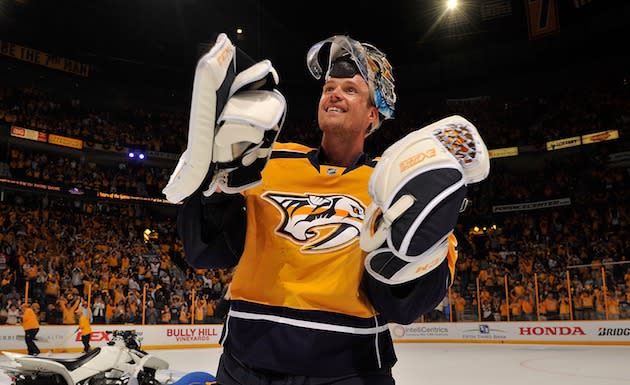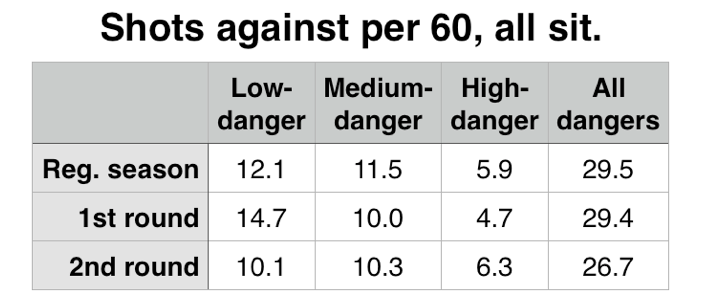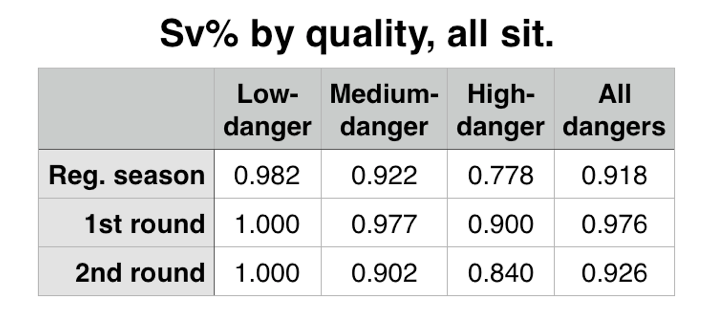Pekka Rinne's top-notch postseason is a team effort (Trending Topics)

Coming into the postseason it was easy to be a little skeptical of this remarkable Nashville Predators team.
They had a lot of talent in their top two lines. They had probably the best D corps of any club left standing, and were probably tops out of all 30 as well. But that bottom-six, and that goaltending? Ehhhhh.
That so many media members (one particularly handsome and intelligent Puck Daddy columnist included) picked Chicago to win that opening-round series is not surprising. Pekka Rinne in particular seemed to be the great leveler. He’d just wrapped up a .918 season, sure, but he was .908 the season before, and more importantly his past two playoff performances saw him go .909 and .906.
While Chicago had certainly thinned out in terms of quality, it wasn’t a stretch to say Corey Crawford (.921 the past two years) could narrow the gap between the teams. I had Chicago in a coinflip. Most in the media had Chicago in a rout.
[Follow Puck Daddy on social media: Twitter | Instagram | Facebook | Tumblr]
Rinne had other ideas.
He, of course, allowed just three goals in that opening series and was outstanding and so on. And while Rinne has allowed eight goals so far against the Blues — including having lost a game, if you can believe that — it’s important to keep in mind that as good as the team in front of him has been (we’ll get to the “how” of it in a second), this is some of the best hockey Rinne has delivered in quite a while.
It goes without saying, one supposes, that when a goaltender has a .953 save percentage across eight playoff games, all but one of which his team won, he is punching above his weight. Doesn’t matter if it’s Rinne, who has been “merely fine” a lot of the time in recent years, or in-his-prime Dominik Hasek. Going .950-something is both a marvel and unsustainable.
But the question that naturally follows the acknowledgement of this impossibility is a simple one: “Or is it?”
We obviously know that the Predators’ top two pairings would be a top pairing for literally any other team in the league, so deep is their top-four that Ryan Ellis was somehow No. 3 on the team in average time on ice this season. And the fact that they can throw Matt Irwin and Yannck Weber, two perfectly above-average bottom-pairing puck-movers, over the boards as a sort of release valve for that crucial top four when they need the occasional shift off? Well, it doesn’t seem fair.
That and the team’s overall defensive werewithal up front as well has certainly made Rinne’s job easier.

Yes, this all comes with the caveat of “small sample size” but you can see that while Chicago gave Rinne about as much work as he faced in the regular season, the team in front of him did a much better job of keeping shots to the outside against Chicago. A 20 percent drop in high-danger shots against is going to make a world of difference.
“Keeping shots to the perimeter” is a much-talked-about skill that few teams have the ability to pull off consistently over the course of the regular season or even a playoff series against other teams with high-end talent. You can make a reasonable case that the Predators, with this top-flight D corps, elite forwards of their own on the top two lines, and one of the stronger defense-only third lines in the league can do it a little more consistently than most.
Of course, things changed against the Blues, which has a slightly better D group in particular, and probably a little more depth up front even without that kind of high-end top-six Chicago has in theory, though I would argue that the Schwartz/Stastny/Tarasenko line is better than Patrick Kane and Co.
A slight uptick in high-danger shots against (that is, in comparison with the regular-season number; it’s obviously a huge jump from the first round) helps to explain the goals-against number increasing nearly 200 percent.
Nonetheless, Rinne is extremely dialed in, playing above his full season in almost all statistical categories, except to say the Blues have gotten a few past him from middle-distance. Not that it matters much.

The thing that happens a lot in the playoffs is a goalie sinks his team by giving up “bad” goals. Rinne hasn’t done that yet. Probably he hasn’t really come close. It’s hard to say he stole the series so far, because even though he’s been phenomenal, Nashville hasn’t really asked him to be anything but. Not with that defensive structure and quality.
What’s amazing is how well the Predators have locked things down in front of Rinne while still maintaining a similar profile in most other regards. We’re talking about a 3 percent increase in low-danger shots per 60, an 11 percent drop in medium SOG, and about 7 percent decline in high-danger. If you’re going to see any percentage change of your team’s shots against, medium- and high-danger ones are the kind you want to cut down on.
So yes, Rinne has been excellent, but so too has the team in front of him. They’re allowing the third-fewest attempts against per 60, and fewest among any team left standing. That kind of quality also goes for unblocked attempts (fifth-fewest, but fewest among non-eliminated teams), shots against (fifth-fewest overall, second-fewest remaining), scoring chances (second-fewest, fewest). Expected goals, too (fourth- and second-fewest).
And, obviously, all that goes toward the team’s playoff-leading 1.33 goals against per 60. The fact that, at the other end of the ice, they also have the third-most goals for is a pretty good recipe for success.
[Join a Yahoo Daily Fantasy Hockey contest now]
You can’t reasonably expect a goaltender to keep up this kind of performance, of course. Not for much longer than Rinne already has. The good news is that his performance has Nashville one win away from a conference final already. And even if he takes a little bit of a step back, the players in front of him are still doing a good enough job that a bit of a dip back to his previous standard might not matter much.
Every stat you look at right now, this team is just rolling. Everything has gone right.
And though few expected it before the playoffs began, that quality starts from the net out.
Ryan Lambert is a Puck Daddy columnist. His email is here and his Twitter is here.
(All statistics via Corsica unless otherwise noted.)
MORE FROM YAHOO HOCKEY:



